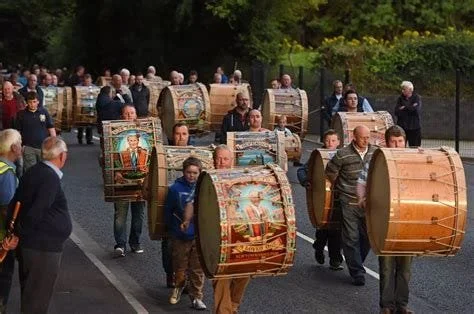Bonfires on a midsummer night in NI
Nothing says triumphalism like bonfires, bouncy castles and burning effigies of immigrants
Welcome to Moygashel in County Tyrone, Northern Ireland. Here, in this village of fewer than 1,000 residents, 930 of whom are of the Protestant faith, before midnight on July 10 a 13-story tower made of very flammable wooden pallets and topped with a boat carrying effigies of a crew of dark-skinned people was put to the torch.
Welcome to Northern Ireland and the kick-off of the Twelfth of July rituals to celebrate that night in 1690 when England’s supporters lit bonfires so the forces of King William, a Protestant, could find and defeat the forces of King James II, a Catholic.
And so it goes in 2025.
“Racist, threatening and offensive. Inhuman and deeply sub-Christian”. Church of Ireland Archbishop of Armagh and Primate of All Ireland John McDowell
“Vile, a dehumanising act that fuels hatred and racism.” Patrick Corrigan, Amnesty International’s Northern Ireland director.
“Artistic protest. Every year the Moygashel bonfire combines artistic protest with their cultural celebration. Their yearly art has itself become a tradition. This year the focus is on the scandal of mass illegal immigration.” Prominent loyalist activist Jamie Bryson.
“Deplorable. This is an absolutely disgusting act, fuelled by sickening racist and far-right attitudes.” Sinn Fein assembly member for Fermanagh and South Tyrone Colm Gildernew.
Light up the night
It’s estimated there will be 300 bonfires lit across the Six Counties on the night of July Twelth. (Moygashel’s inferno was lit before midnight on July 10) Thousands will march at 18 locations. Parades will include 600 marching bands moving to the constant beat of dozens of huge and loud “Loyalist Lambeg Drums.” And for the wee ones this weekend, “Smaller children's bonfires and events, which often include bouncy castles, local bands, games and music, run earlier in the day near most bonfires,” per the BBC.
Meanwhile in Dungannon
The bonfire topped with the boat and Republic of Ireland flag was ignited Thursday night not three miles from a town called Dungannon (pop. 16,000). The smoke from Moygashel could easily be seen there. It is the most ethnically diverse town in the Six Counties. It’s also pretty Catholic, with two out of three residents subscribing to that belief system. It wouldn’t be much of a stretch to suggest that those effigies are meant to represent the largest non-white ethnic group in Dungannon, the East Timorese from Southeast Asia, who make up 11% of the population. The second largest group of non-natives comes from Lithuania.
Justina Cesnauskiene came to Dungannon from there with her family when she was 12.
Irma Jonutiene, left, and her daughter Justina Cesnauskiene. Photo by Luke Butterly, The Detail.
“When we moved here, it (the religious divide) was very strong, and especially on the 12th of July, you know, it was mad. The bonfires, the people would go and drink and all that. And if they would see the immigrants it would be, you know…We were always in the house at that time, on that day, because it was not safe.”
Despite criticism from the politicians that represent Loyalist communities, the sophisticated torching of Nationalist symbols, Irish flags and even candidate’s posters continues. In 2023 a large photo of Michelle O’Neill, Sinn Fein’s leader in the NI Assembly, was featured on one of the bigger bonfire structures.
Loyalist leaders were shocked.
Orange Order grand secretary, the Reverend Mervyn Gibson, described the burning of effigies and election posters as wrong."Bonfires should be celebratory events and not about condemning anyone else's politics or culture,” he told the BBC.
Democratic Unionist Party (DUP) leader Sir Jeffrey Donaldson, who recently stepped down while alleged sexual improprieties are investigated, urged people in 2023 not to burn flags or effigies on bonfires, describing it as “wrong and disrespectful.”
Ulster Unionist Party leader Doug Beattie described this incident as "vile and hateful", while Alliance Party MLA Eóin Tennyson said it was "disgraceful and completely unacceptable".
But, said one Protestant rep in Stormont, Deborah Erskine, don’t forget about the bouncy castles because many events would be held "without burning flags, symbols or effigies.”
See youse next year.
Further Reading
The perspective of immigrants on 12 July are featured in this article on TheDetail.tv
The BBC has this Explainer
DISCLAIMER - Though I hold a leadership position with the Portland Hibernian Society, any opinions given at Gallagher’s Irish Celtic Corner are strictly those of the author and no one else.



